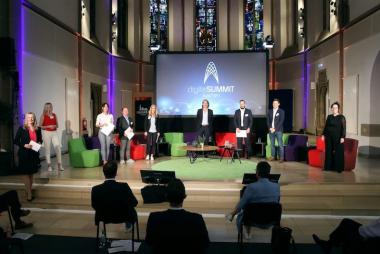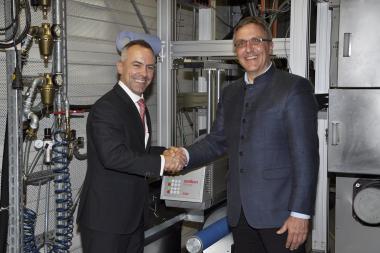Young Talent Award for AI supported production control of carbon fibres
- Formula 1 cars will be cheaper in future
Carbon is the stuff Formula 1 cars are made of, at least the bodywork. But until now, carbon has been expensive. It can be produced more cheaply and efficiently if artificial intelligence monitors the production processes. A camera system combined with artificial intelligence automatically detects defects in the production of carbon fibres. This makes expensive manual inspection of the carbon fibres obsolete and the production price of the carbon fibre can be reduced in the long term.
For this idea, the young engineer Deniz Sinan Yesilyurt received the second prize of the "Digitalisation in Mechanical Engineering" Young Talent Award on 6 December.
Carbon fibres are sought after because of their good properties. They are very light - they weigh up to 50 percent less than aluminium. The combination of low weight and good mechanical properties offers many advantages. Especially in times of the energy transition, lightweight materials like carbon are more relevant than ever before. At the same time, carbon fibres are as resistant to external stresses as metals. However, achieving these good properties of carbon fibres is very complex.
Up to 300 individual fibre strands - bundles of individual fibres - have to be monitored simultaneously during production. If carbon fibres tear, it costs time and money to sort out the damaged fibres. This is just one example of various defects that can occur in the fibres during production.
Therefore, Deniz Sinan Yesilyurt attached a camera to the carbon fibre line that takes pictures of various fibre defects during production and collects them in a database. The artificial intelligence in the camera's information technology system evaluates the fibre defects by assigning the images to predefined reference defects. In doing so, it recognises various fibre defects with a classification accuracy of 99 per cent. The process can also be used in other areas that produce chemical fibres.
Deniz Sinan Yesilyurt received the prize from the German Engineering Federation (VDMA) in Frankfurt am Main, Germany. He is a Bachelor's graduate at the Institut für Textiltechnik (ITA) of RWTH Aachen University. The full title of his bachelor's thesis is: "Development of a Kl-supported process monitoring using machine learning to detect fibre damage in the stabilisation process". The VDMA awarded the prize to a total of four theses from different universities. The prize is awarded for outstanding theses and was offered in Germany, Austria and Switzerland.
ITA – Institut für Textiltechnik of RWTH Aachen Universit











